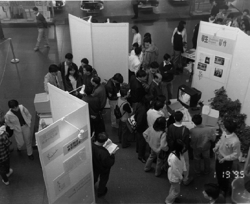Exhibitions
Systems engineering
By Romy Cheuk
|
Systems engineering is the study of making the best of technology in order to get the most efficient result, according to Prof. Vincent Yu-sun Lum, chairman of the Department of Systems Engineering and Engineering Management at The Chinese University of Hong Kong.
Said he: "It is essential to make the world progress orderly and our lives proceed in a meaningful and manageable way.
"Without a system or a systematic way of doing things, our lives would be in chaos and nothing would function."
|
 |
The exhibition in Sha Tin's New Town Plaza
attracted crowds of people. |
|
Hence, an exhibition, "Systems Engineered City", was held in January to demonstrate how engineering methods can be applied to solve city problems.
It was organised by students from the Department of Systems Engineering and Engineering Management at the Chinese University.
Mr. Edward C.M. Lau, president of the exhibition's organizing committee, said, "Our aim was to let the public know what systems engineering is.
"In order to bring out the highest efficiency and improvement of our lives, our main theme was not promoting the most advanced technology, but to demonstrate how we can apply them practically."
He said that holding an exhibition was the best way to promote systems engineering.
"Since systems engineering is an integrated subject, it is related to many fields.
"Therefore, we have spent much time in thinking how it can be brought out in the exhibition. It took a year's preparation.
"The public is not interested in theories. By displaying our product development projects, like the fish ball selling machine, they may find out what we are concerned with," Mr. Lau added.
Systems engineering would be more comprehensible if engineering management is added to the concept.
"Engineering management is more technically-oriented than general management," Prof. Lum explained.
"Systems engineering and engineering management are multi-disciplinary studies which teach students to look at things in a broad perspective," he said.
These subjects are only available at The Chinese University of Hong Kong. The subjects were added to the curriculum in 1992.
The curriculum covers three fields: management, computers and scientific techniques, and mathematical techniques.
Prof. Lum explained the need for each. "With management skills, we can handle human relationships as well as man-machine relationships.
"Computers, on the other hand, help us to manage information and resources much more easily.
"With scientific and mathematical techniques, we can create clear concepts, do analyses, come up with solutions, and execute the plans defined."
Mr. Lau, the president of the exhibition committee, further defined the sucess of students' work.
He said, "Whether a product made is successful is not the most important part of the project, since it also includes research to define the target customers and find out their requirements."
Regarding the achivements of the exhibition, Mr. Lau expressed satisfaction.
"The public's response was quite good.
"Some visitors even asked technical questions - this was beyond our expectations."
Mr. Thomas Kwan, responsible for a demonstration at the exhibition, said, "Now, people have a fundamental understanding of how different products can help in automation."
However, he believed that over half of the visitors still did not understand what systems engineering was, as they usually paid most of their attention to the students' projects and the section on office automation.
Miss Daisy Tang, a 19-year-old visitor, said that the exhibition was interesting, but she was still not sure what systems engineering was.
"The most attractive part is a student's project, the fish-ball selling machine," she said.
Prof. Lum considered systems engineering important in future development.
He said, "If systems engineering is applied appropriately in a company, it can help to organize resources and make more accurate expectations.
"The larger the company, the more essential it is to introduce systems engineering."
Return to contents
